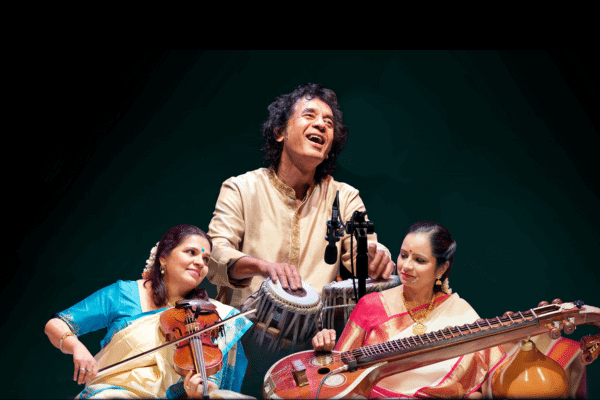Watching Kala Ramnath, Jayanthi Kumaresh and Zakir Hussain present the Charukeshi raga in their recent concert Triveni, it was as if the boundary between Carnatic and Hindustani music had melted away. The atmosphere resonated with the sheer bliss of their music.
Performing to a full house at the Sydney Opera House, Kala Ramnath on the violin and Jayanthi Kumaresh on the Saraswathi veena excelled in sparkling glee. When they performed the alapanas, it was as if someone intimate was telling us a story. After their exploration of the different shades of the raga, Zakir Hussain joined with his tabla (three pieces for the occasion). Then it was as if the three took us on a journey to a distant land. How his fingers adjusted themselves to the rendering of the two ladies was astonishing. He became the thread that stitched the two styles of music together.
This was no jugalbandhi – where stalwarts from the two systems try to outdo each other. This was a confluence where each of the three cooperated and collaborated with others.
View this post on Instagram
And yet, there was room to bring out the characteristic nuances of the two streams of music. Ramnath rendered ragas Pooriadhanashri and Behag in some detail, while Kumaresh spelt out Hamsanandi and Panthvarali.
The crowd eagerly waited for Zakir Hussain to perform his solo interlude. And when he did, he left no doubts that he was indeed a genius. What a fabulous variety of sounds! It was a Disneyland of effects. He further animated his handwork with his delightful bols – speaking to us, as it were, with his tabla. In return, the audience broke out in joyous celebration.
Again, at Melbourne a day later, Zakir Hussain was the cynosure of all eyes as the trio presented Triveni, this time at the Robert Blackwood Hall at Monash University.

Seated between the two instrumentalists, Hussain personified the tabla, and the evening was very much his. He introduced Kala Ramnath and Jayanthi Kumaresh and set the pace, with the audience hanging on to every beat of his tabla! Needless to say, he regaled the audience with his mastery of the percussion instrument, from the slowest strains of an aalap to the tarana, culminating in the kalpana swaras rendered at breakneck speed, reaching a crescendo with a solo tabla rendition. The main raga of the evening’s performance was Keeravani/Kirwani in teen taal or adi talam – the melody being the same in both styles allowed for easy crossovers.
Both Ramnath and Kumaresh delighted the audience; Jayanthi Kumaresh presented a medley of ragas towards the end, and the pallavi was enchanting. However, it was Kala Ramnath who stole people’s heart with a superb expose of not only Kirwani, but other ragas as well towards the end, culminating in some brilliant fast-paced delivery. Hussain reproduced and responded to the complex rhythms of the musical instruments with such agility that one could hear his tabla echo the melody of the violin and veena!
There was a standing ovation at the end, with the audience cheering the trio for minutes.
About Triveni, and the golden trio
This outstanding and uplifting Indian classical music event Triveni was organised by the Bhumija Trust. Bhumija was founded in 2012 in Bengaluru with a view to making the finest of performing arts available to all. As the name Triveni suggests, it is the coming together of three streams of Indian classical music – Hindustani, Carnatic … and percussion! The three stars Kala Ramnath, Jayanthi Kumaresh and Zakir Hussain came together for the first time in 2022 in a tour of the US, this being their first Australian tour.
View this post on Instagram
Kala Ramnath hails from a family of illustrious musicians straddling both the Hindustani and Carnatic music styles. Although Chennai-born and brought up, she learnt from her guru and aunt, the famous N Rajam, a Hindustani violinist par excellence and scion of the Mewati gharana. Her uncle is TN Krishnan, the renowned Carnatic violinist, and her cousin Sangeeta Shankar. Kala Ramnath has contributed a lot with fusion music over the years, with well-known musicians.
Jayanthi Kumaresh (in whose family, it is said, everyone is born with a violin in hand) is the niece of the great violinist and composer Lalgudi Jayaraman and has long dominated the veena music scene for 30 years. Rasikas will remember her first visit to Melbourne more than 25 years ago: age has not withered nor custom stale her infinite mastery of this ancient instrument.

Zakir Hussain needs no introduction: he does bestride the tabla world like a colossus! He was a child prodigy, and tabla is in his blood (he is the son of the phenomenal tabla artiste Alla Rakha). He began performing professionally at the age of twelve, accompanying India’s greatest classical musicians and dancers and touring internationally to great acclaim by the age of eighteen. One of Zakir Hussain’s significant contributions has been the facilitation of a musical dialogue between Hindustani and Carnatic music. Not only has he won the Padma Vibhushan award, but he also made history at the 2024 Grammy Awards becoming the first Indian to win three Grammys in a single night. He was among the winners in the ‘Best Global Music Performance,’ ‘Best Contemporary Instrumental Album’ and ‘Best Global Music Album categories.’ He has collaborated with several world-renowned musicians in producing some truly innovative works. Naturally, his name was the big draw card – not only in these works but also at Triveni’s Australian tour this year.
READ MORE: 2024 Grammys: A delightful harvest for Zakir Hussain and Indian music





